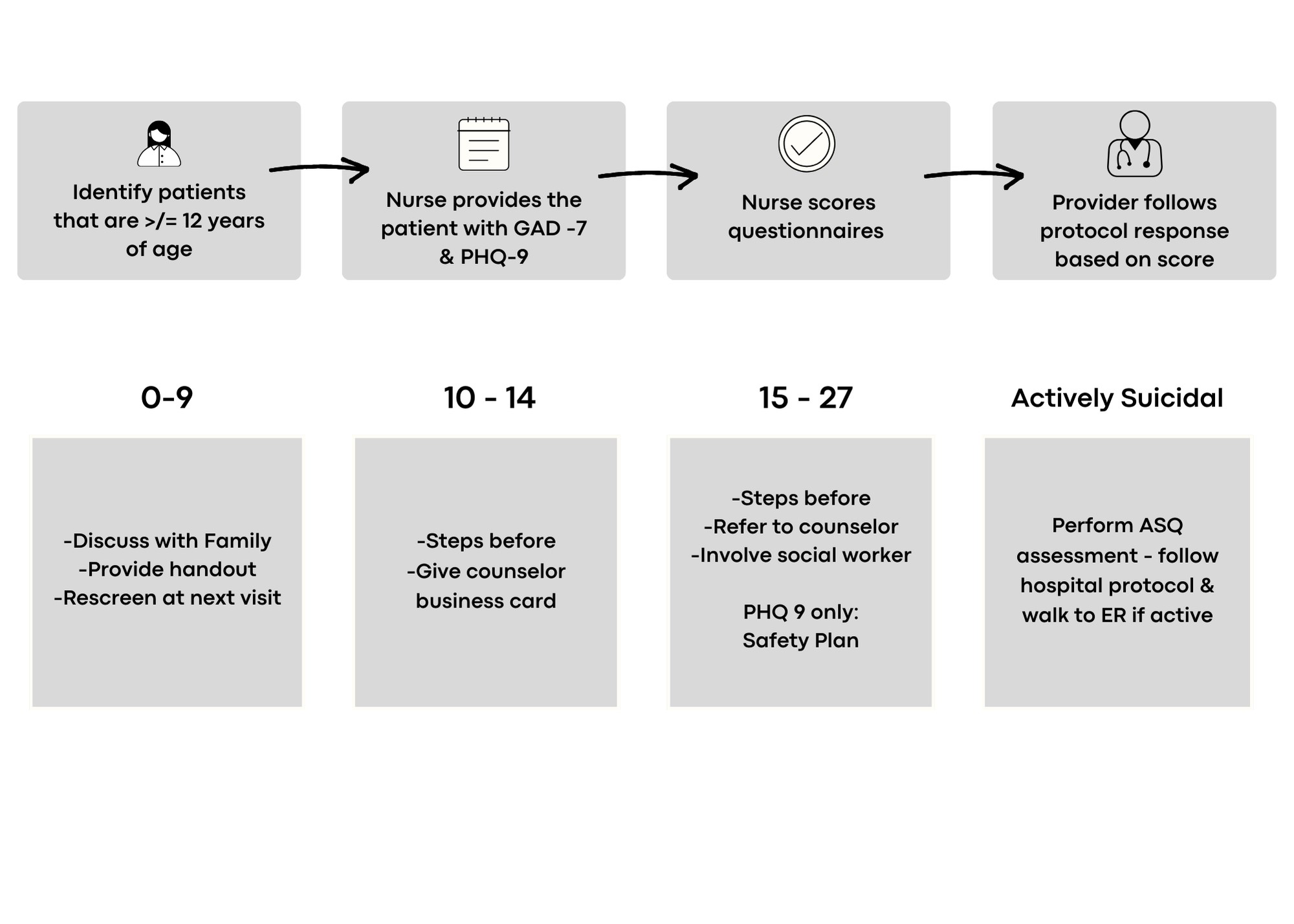Session Information
Session Type: Poster Session B
Session Time: 10:30AM-12:30PM
Background/Purpose: Pediatric patients living with chronic rheumatic diseases have high rates of anxiety and depression, which can lead to adverse health outcomes. In 2018, The American Board of Pediatrics launched The RoadMap Project to support the emotional needs of patients with chronic diseases. This project provides clinicians with a toolkit and framework for implementing surveillance and assessment of emotional health in pediatric subspecialty practices. Our local pediatric rheumatology clinic utilized the The RoadMap Project framework to develop a workflow for implementing mental health screening questionnaires into routine clinical practices. This quality improvement initiative aimed to assess the prevalence of anxiety and depression within our patient population and ensure timely allocation of resources to help address mental health concerns identified.
Methods: Beginning October 1, 2024, the Patient Health Questionnaire-9 (PHQ-9) and the Generalized Anxiety Disorder Scale-7 (GAD-7) were piloted in two rheumatology provider clinics for all return visits with patients aged 12 years and older. The nursing staff integrated these questionnaires into the clinical workflow as part of the intake process. Once patients completed the questionnaires, the nursing staff entered scores in a flowsheet within the electronic medical record. A structured response protocol was developed to guide screening responses in real-time. Depending on the severity of symptoms identified, patients were provided a comprehensive mental health educational handout, referred to a licensed counselor within our institution, and/or had a real-time social work consult with safety planning and administration of the Ask Suicide Screening Questions (ASQ) if necessitated. On March 1, 2025 we expanded the screening process to two additional rheumatology provider clinics.
Results: From October 2024 through April 2025, mental health screenings have been completed for a total of 125 patients. Based on PHQ-9 results, 14% of patients reported no depression symptoms, 67% had minimal to mild symptoms (1-9), 9% had moderate symptoms (10-14), and 10% had moderately severe to severe symptoms (15-27). Suicidal ideation was endorsed by six patients, all of whom completed further evaluation using the ASQ tool and none were determined to be actively suicidal at the time of screening. GAD-7 results indicated 21% of patients reported no anxiety symptoms, 53% had minimal to mild symptoms (1-9), 19% had moderate symptoms (10-14), and 7% had severe symptoms (15-21).
Conclusion: We have successfully piloted routine mental health screenings in our pediatric rheumatology clinic, with a plan for complete adoption. In screenings completed to date, we have identified that a majority of pediatric rheumatology patients report mild to moderate symptoms of depression and anxiety, supporting the need for dissemination of mental health screenings as part of standard care. Future efforts will focus on automating the screening process within the electronic medical record to enhance efficiency and sustainability.
 Figure 1. Structured screening and response protocol for PHQ-9 and GAD-7 questionnaires.
Figure 1. Structured screening and response protocol for PHQ-9 and GAD-7 questionnaires.
To cite this abstract in AMA style:
Walker B, Timmerman L, Bridges J, Harbison S, Lacy C, Lowery J, McAllister L, Reed A, Rife E, Robles Sanchez I, Webb T, Wyrosdick B, Mannion M, Smitherman E. Mental Health Screening Implementation for Pediatric Rheumatology Patients at a Tertiary Academic Medical Center [abstract]. Arthritis Rheumatol. 2025; 77 (suppl 9). https://acrabstracts.org/abstract/mental-health-screening-implementation-for-pediatric-rheumatology-patients-at-a-tertiary-academic-medical-center/. Accessed .« Back to ACR Convergence 2025
ACR Meeting Abstracts - https://acrabstracts.org/abstract/mental-health-screening-implementation-for-pediatric-rheumatology-patients-at-a-tertiary-academic-medical-center/
